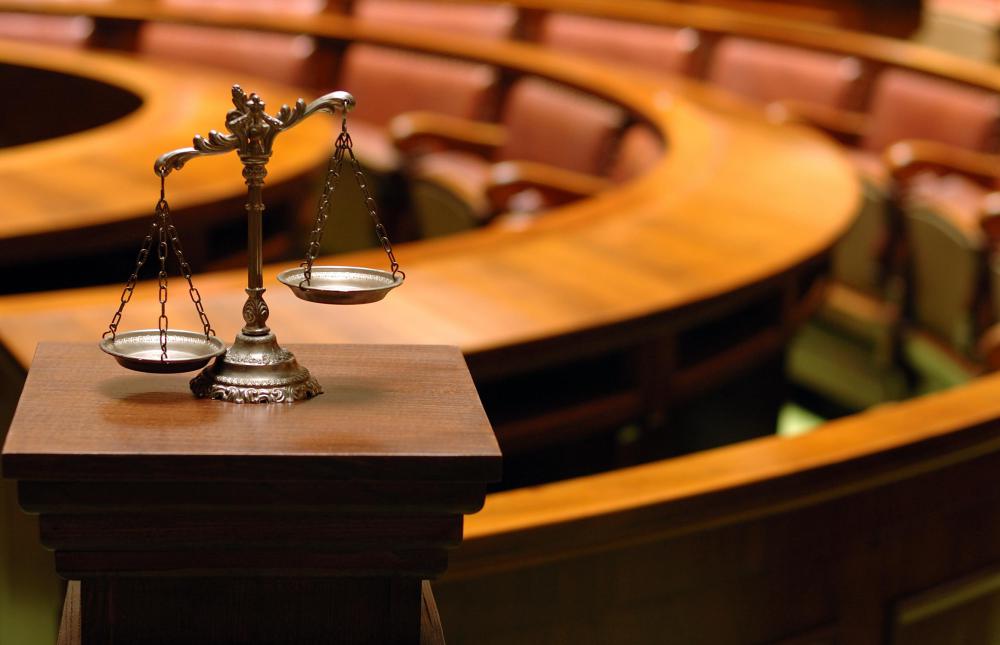At WiseGEEK, we're committed to delivering accurate, trustworthy information. Our expert-authored content is rigorously fact-checked and sourced from credible authorities. Discover how we uphold the highest standards in providing you with reliable knowledge.
What is a Criminal Indictment?
A criminal indictment is a written document which formally accuses someone of violating criminal law. In some nations, a criminal indictment is required before someone can be brought to trial, while in other regions there may be other ways to bring people to trial, depending on the structure of the judicial system. Indictments are generally handed down by a grand jury, a group of individuals who meet to confirm that a crime occurred and to identify a likely suspect, with the assistance of presentations from people such as government attorneys.
In a criminal indictment, the document formally spells out the crime committed and provides a brief description of the nature of the crime and the details, naming an accused suspect. If someone is being indicted for committing multiple crimes, the criminal indictment will include a separate “count” for each crime. For example, someone could be indicted on one count of kidnapping and one count of murder if he or she is believed to have kidnapped and murdered someone.

The indictment is an important step in the judicial process. Before a criminal indictment can be issued, criminal investigators have to explore the crime, gather evidence, find potential suspects, and conduct general investigative work with the goal of building a strong case. With this information in hand, a government attorney can approach a grand jury and request a criminal indictment so that someone can be tried in court for the crime.

In some cases, an attorney may request that grand jury proceedings and the subsequent indictment be sealed. This is done when there is a concern about the safety of people on the grand jury, people who may present evidence, and other members of the community, or when there is a worry that the person being indicted may flee before the formal accusation can be issued. In these cases, the seal is lifted once the accused is apprehended and brought to trial. If the accused cannot be apprehended, the indictment will be remain sealed and the case will be kept open in the hopes that someday the suspected perpetrator can be tried in court.

Many legal systems rest upon the premise that people are presumed innocent. An indictment is a formal accusation, but it is not a verdict. Being indicted does not mean that someone has committed a crime, it only means that there is evidence which seems to indicate that someone committed a crime, and that the government feels that there is enough evidence to bring the accused to trial.
AS FEATURED ON:
AS FEATURED ON:














Discussion Comments
If there were a case where no indictment was found by a grand jury, how does law enforcement continue to pursue the case?
Can the fact that a grand jury already saw no evidence to the crime being true help a person who's been pursued by the law enforcement agency?
With my personal experience in regards to a Grand Jury, it is made up from the same list of people who get called for jury duty. There are no judges on the grand unless they are retired from their seat.
As for where in the whole process does the grand jury fit in, once again from my personal experience, once there has been a formal complaint made and they have investigated the complaint they then take the complaint and what they have found in their investigation to the grand jury and it is after the grand jury hearing when they have turned in a "true bill" to a judge that the arrest happens. The judge has to issue the arrest warrant before they can arrest the suspect whom is named in the complaint.
This was how the proceedings went in the case that was a personal matter of mine. As for how things are suppose to go from that point on, I am sorry to say I cannot say for sure because as I was told, how things would go and the way things did go were not at all the same. Things did not go like I was told they would. And so I cannot tell you anything more as to how the proceedings go from that point and on.
Can an indictment be legal if the state's attorney did not sign it in Illinois?
What happens if you have gone to court, and tried to plead guilty for the misdemeanor, but the prosecutor has built up the crime beyond proportion with lies to get a felony and prison time. Therefore it is going to the grand jury. How does one defend themselves when they don't have the means to fight a big company with no money? And does a public defender actually help?
@cardsfan27 - I'm not sure about the warrant issue. I would be interested to know the answer to that as well.
I can tell you what a grand jury is, though. It is composed of people that are part of the normal jury pool. It doesn't involve any judges at all (unless of course a retired judge happened to be selected randomly). Instead of a normal trial jury that meets for one case, a grand jury meets several time a week to look at cases and issue criminal indictments.
I had a relative who was part of a grand jury once. Her term was one year. I think that is the normal length. Because of the time requirements, most people on a grand jury are either retired or have flexible job hours that let them make the big time commitment.
What happens if the person who supposedly committed a crime wasn't actually arrested yet. For example, if there is a criminal assault charge, and it is known who the assailant is, but the person left the crime scene before police arrived.
Do the police have to get a warrant for the person's arrest and have them in custody before an indictment can be made, or does it work the opposite way where the indictment gives the court reason to issue the warrant?
Also, I hear the term grand jury used a lot but still don't know what it means. Who exactly is on a grand jury? Is it just all of the judges from the district or some other group of people?
@kentuckycat - Legally, I believe it has to happen with every criminal case regardless of severity.
This is how I understand it in my state. I assume it is the same or similar everywhere else. The way it works is that someone gets arrested for a crime, then the charges are presented to a grand jury by the prosecutor. They then decide if there is sufficient evidence for the person to possibly go to trial.
If they decide there is probable cause, the criminal gets an arraignment where a judge sets bail and any other provisions concerning the crime. A common one is that the person cannot leave the state. Soon after the arraignment, there is a pre-trial hearing where a person can plead guilty or not guilty. If they plead not guilty, they move on to a trial. If they plead guilty or no contest, the judge passes down a sentence or a sentencing hearing is set up.
Does this happen with every criminal case or only for things like felonies or situations where the criminal isn't arrested at the time the crime is committed? I'm not sure I understand when it gets used.
Are there different criminal indictments for different situations? For example, are there local, state, and federal criminal indictments depending on the crime?
How does the court process work when you end up with an indictment?
Post your comments